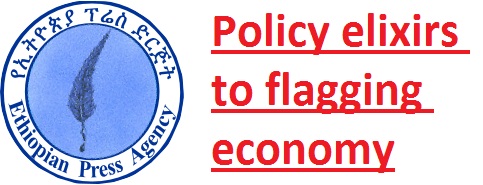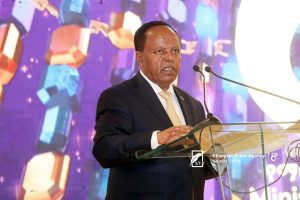
Ethiopia has been portraying a swift economic growth over the last two decades. This was testified by World Bank, IMF and other global bodies. However, the economy has been experiencing a slowdown over the last couple of years due to the political unrest that rocked some parts of the country. This has forced the ruling party to overhaul its leadership in a bid to ensure fundamental reforms.
As part of the ongoing reforms, the leadership led by Prime Minister Abiy Ahmed has been displaying a remarkable turns for the better in political and diplomatic aspects. He has formed new cabinets whose members are energetic and committed to sustain the change, freed political prisoners and allowed previously outlawed groups to exercise their political rights.
Moreover, he had done away with the doldrums-like situation between Ethiopia and Eritrea. Nevertheless, the economic reform has yet to be jumpstarted in a way of realizing a comprehensive and fair economic transformation.
What are the factors that resulted in economic stagnation in recent years? How could the government and pertinent bodies tackle the challenges? What kind of policy elixirs should the government use to rejuvenate the economy? Apparently, the political unrest which had surfaced in the course of the last couple of years has negatively impacted the economy and this does not come as a surprise in a nation that implements an overall reform, economics lecturer at Addis Ababa University, Sisay Mengistu states. ‘‘The administration of Prime Minister Abiy Ahmed basks under several achievements it exhibited within 12 months.
Most of its reforms revolve around the political sector. Now, it should zoom its face toward giving a kiss of life to the economy being harmed by protests. Otherwise the intended reform could not come anywhere near success. Implementing firm economic reform therefore goes without saying,’’ he underlines. He adds that there should be across the board utilization of nation’s resources. There has to be fair and equal opportunities among citizens. The government should strive towards this end.
‘‘The government needs to narrow down the big chasm between the rich and the poor putting in place feasible policies and strategies. The undercurrent factors that give birth to unfair distribution of resources should be singled out and redressed prudentially.” Seeing to the prevalence of even investment endeavors among states of the country is another important issue the scholar stresses significant. Many of the development undertakings and infrastructural facilities are built in the capital Addis Ababa.
Hence, it would be a wise move if it is distributed equally among all villages and towns of the country. ‘‘When resources of a nation proliferate in one area, the situation will create social crisis.Rural-to-urban migration that attends the situation could spawn social problems in urban areas. It hardly breathes life into a stagnated economy,’’ he said. Adding: ‘‘There has to be a fair distribution of resources and evenly-spread development activities.
Budget should be apportioned fairly. The scale of poverty and unemployment rate prevalent across the country must be taken into account. In the observance of the aforementioned exingencies, there will be a proportional or a healthy economic growth.’’ As Mewael Desta, an economist and lecturer at Mekelle University, debt burden could hamper the economy from showcasing a swift pace the way it did before the political unrests the nation experienced. ‘‘Ethiopia is one of the countries in Africa buckling under amassed debt loads.
It has been receiving huge Chinese loan over the last two decades. Now, its total foreign debt has reached a level that could make the nation subject to distress. As of recently, China has cancelled all interest-free loans it had advanced to Ethiopia at the end of year 2018, according to the Prime Minister’s Office. Meanwhile, IMF has extrapolated that the Ethiopian economy will grow by 8.5 percent by 2018/19.This would be taken as a huge achievement for a country which is undergoing radical reforms.
Mewael insists that foreign trade should be stepped up to realize robust economic growth and to slash down debt. ‘‘Nowadays, any country is expected to enhance its export commodities in quantity as well as quality to be competitive in the global market. One could not turn out competitive by exporting unprocessed agricultural products. One needs to dispatch manufactured items that would be looked-forward in the global arena,’’ he underscores.
The proliferation of industrial parks will have a pivotal role in maximizing foreign trade since they are expected to come up with manufactured items for export consumption, according to him. Economic inequality among citizens, cities and states would pave ways for political uncertainty, Amanuel Tadese, Political Science and International Relations lecturer at Addis Ababa explains. ‘‘Economy is the determinant factor toward ensuring political stability. There should be a fair distribution of resources in every corner of the country.
Otherwise, unemployed youths would be desperate. They would be forced to indulge in illegal activities for want of jobs. Hence, job creation schemes should be made a point of and strengthened to slash down poverty and unemployment,’’ he emphasized. As to him, expanding micro, small and medium scale enterprises has a pivotal role in reducing poverty and bolstering the economy. The government has a good record of lifting millions out of abject poverty.
Mewael recommends that the government needs to rework its economic policies to synchronize them with the ever-growing population and other challenges. ‘‘The government should revise its fiscal policies to ensure growth. It must design new policies and strategies which could address existing challenges. Economic reform must be implemented.’’
The administration of Prime Minister Abiy Ahmed has made possible incredible changes in its one year tenure. It has demonstrated conviction to nurse the festered politics back to life. The political space has widened and freedom of speech is enjoying a green light than ever before. Now, rolling the ball of economic reform is pending. The government has to strive to realize economic reform putting equitability at the kernel. Thus, the nation would sustain the change, which is vital for ensuring peace, stability, prosperity and democratization.
The Ethiopian Herald, Sunday Edition May 12/2019
BY TSEGAY HAGOS





